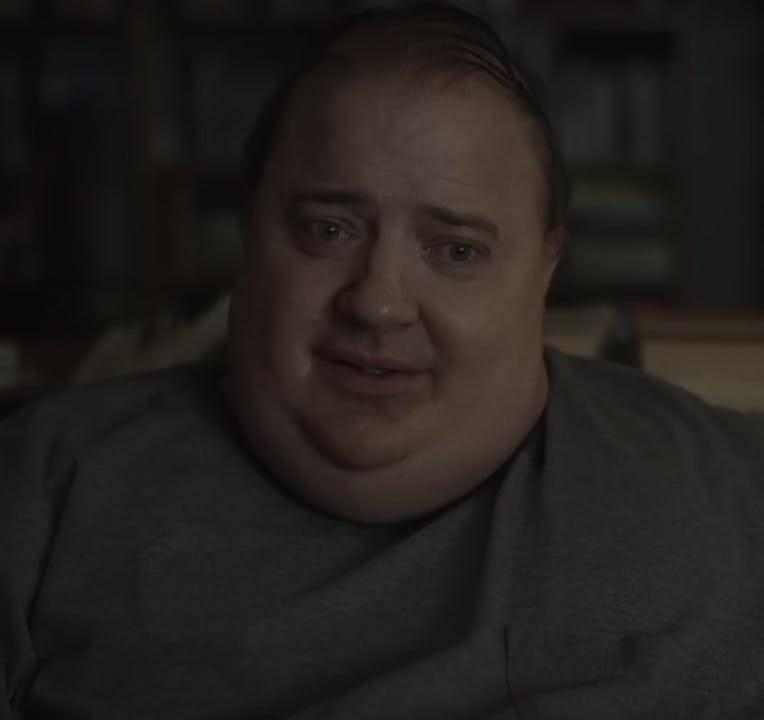'The Whale' Is More Than Cheap Spectacle
Brendan Fraser’s performance prevents the film from becoming a grim exercise in rubbernecking

Perennial miserablist Darren Aronofsky seems like just the guy to adapt a play about the final week in the life of a morbidly obese man coming to terms with his imminent death. In one fashion or another all of his projects have been harrowing, and he courts controversy both on and off-screen (the firestorm surrounding mother! was behind the J-Law and Aronofsky split back in 2017). Nevertheless, his latest project has been the subject of particular speculation and trepidation since it was announced in January 2021, owing to concerns that The Whale would be little more than a pitiful spectacle about fatness — an arthouse episode of My 600-Lb. Life.
Those concerns were not entirely unfounded, given that the photos from the original (critically acclaimed!) staging of Samuel D Hunter’s play show a few actors approximating obesity with fat suits in a way that verges on parody. The title itself, divorced from the context of the story, implies a sense of derision. Fatness has long been associated with moral failing or overindulgence, particularly in America, and The Whale could so easily become an invitation to gawk and glare, reinforcing the idea that fat people should be scorned and shamed, often for their own good.
In The Whale, Charlie (Brendan Fraser), a former teacher and shut-in living in a dark suburban Idaho apartment, encounters Thomas (Ty Simpkins), a young missionary, who happens to be going door-to-door preaching when Charlie suffers severe chest pains. Charlie’s friend and nurse Liz — the criminally underrated Hong Chau — begs him to seek urgent medical help as his heart is failing, but Charlie declines, instead attempting to reconnect with his estranged daughter Ellie (a suitably venomous Sadie Sink). He walked out on her and her mother eight years prior, after falling in love with his night class student, Alan, who was also Liz’s brother. Ellie makes it clear she has no interest in reconnecting with her father, who disgusts her, but she continues visiting after Charlie offers to pay her. Thomas, meanwhile, sees him as a soul to be saved.
Biblical allusions are inevitable with Aronofsky, and while the film’s title comes from its recurring reference to Moby Dick (Charlie repeatedly reads a passage from an essay about the book to soothe himself whenever he is in pain), the rain which pours down outside Charlie’s window a foreboding indication of an incoming flood. Outside his window, Charlie leaves food scraps on a plate for a bird that visits — a dove of peace, who may yet return with an olive branch. But one night Charlie realizes the plate is broken and the bird has gone. The only possibility for new life, then, is New Life, the cultish organization Thomas works for, who coincidentally are the same group Charlie’s deceased partner Alan was a member of. Charlie rejects Thomas’s notions about repenting and embracing Christ’s light. For him, people — not a higher power — offer the greatest chance at connection.
In the final days of his life, Charlie is still searching for that closeness, or at least confirmation that his life — as full of regret and grief as it is — hasn’t been a waste. It’s Fraser’s performance that prevents The Whale from becoming a grim exercise in rubbernecking. Most interestingly, he presents Charlie as cognizant of his situation and his decision to choose a slow suicide, seemingly at peace with the immediacy of his death. It’s a depiction of depression rarely seen in pop culture, but equally valuable is the tenderness presented between Charlie and Liz. Bound by their grief, the pair clearly love each other but struggle to understand each other. Meanwhile Samantha Morton’s singular scene as Charlie’s exasperated ex-wife conveys a lingering affection beneath current irritation.
Still, there’s a concern that The Whale defines Charlie by his fatness, rather than his character — a handful of spotty flashbacks are our only indication of his life prior to the start of the story, constricted by the short timescale. There is something uncanny too about the visual effects used to alter Fraser’s appearance; while a long way from the likes of Shallow Hal, these still seem to exaggerate his movements and appearance in a way that dips into the grotesque.
Charlie’s fatness is the result of an eating disorder, which developed after his partner died by suicide, and we witness this in one awful scene in which he distraughtly binges on food until he makes himself sick, shot with the piercing horror of Jared Leto shooting heroin or Ellen Burstyn’s diet pill addiction in Aronofsky’s Requiem for a Dream. The emptiness in Charlie’s life has been filled with food, and his relationship with eating is symptomatic of his depression and guilt regarding not only Alan’s death but his abandonment of his wife and daughter.
This specificity is important to note. The Whale cannot speak to every experience of being fat (race, gender and sexuality all have differing intersections with weight) or even the “routine” experience of fatness, but it does speak to the way in which eating disorders among fat people are routinely ignored or dismissed as mere gluttony. As a film about fatness, it’s limited in scope. As a film about disordered eating and the ramifications of grief and shame, The Whale succeeds greatly.
The Whale is much more about the necessity of human connection and the heavy burden of grief than Charlie’s weight. “Do you ever get the feeling that people are incapable of not caring?” he asks Liz with a beatific smile. The procession of mourners who pass through Charlie’s living wake — his daughter, his ex-wife, his best friend, a wide-eyed, well-meaning preacher — seem to indicate he’s right.
Hannah Strong is the Digital Editor at Little White Lies magazine and author of Sofia Coppola: Forever Young. She lives in London.